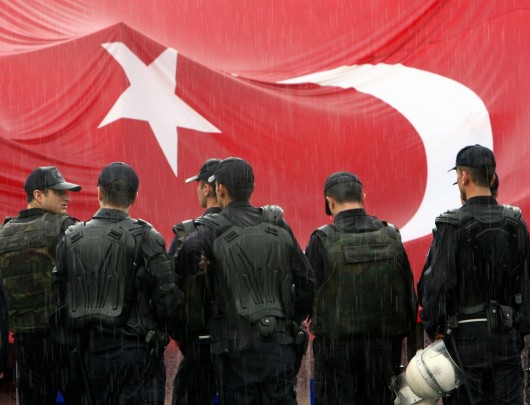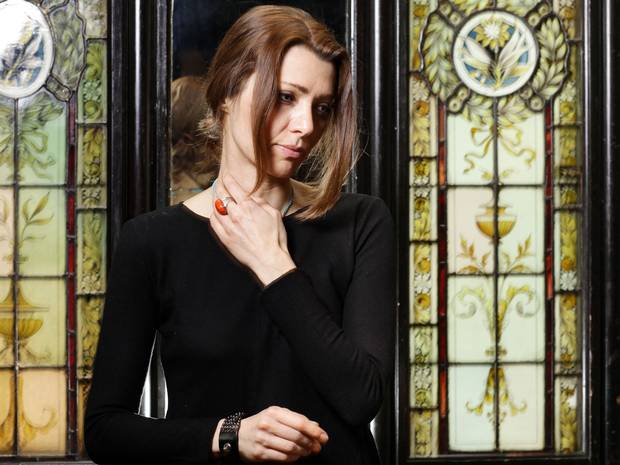La paura. Ecco che cosa indicava la scrittrice turca Elif Shafak, parlando del tabù armeno e della Turchia, in questa intervista dell’Independent un anno fa. Da rileggere le parole dell’autrice della “Bastarda di Istanbul”, il coraggioso libro per cui nel 2006 Elif è stata processata in Turchia (nella foto i militari fuori del Tribunale nelle udienze del 2006). Ecco l’Independent del 13 aprile 2013:.
Elif Shafak: ‘Fear is a very dangerous thing’
Saturday 13 April 2013
When I invited Elif Shafak to lunch at Julie’s, a smart London restaurant tucked between the Victorian town houses of Holland Park, I hadn’t considered the decor. Carved wooden panels, rugs and leather stools: it looked like someone had made a quick raid on the Ottoman Empire to furnish it. Would Shafak, who is from Istanbul, roll her eyes at the cliché of inviting her to a faux oriental den? She looks around. “How lovely,” she says, a little coolly.
Dressed head to toe in black (she claims that this is the only colour in her wardrobe) and with the looks of a French film star, Shafak is an easy choice to be the face for the London Book Fair, the special focus of which this year is Turkish literature. Her 2006 novel The Bastard of Istanbul was long-listed for the Orange Prize. She followed it with a retelling of the life of the 13th-century poet Rumi folded into the life of a bored Jewish-American housewife, in The Forty Rules of Love. And last year she published Honour, the story of an “honour” killing by a Turkish Kurdish family living between their home country and Dalston.
That diversity comes from her own internationalism. Born in Strasbourg, she’s lived across Europe and America and now divides her time between Istanbul, where her husband is editor-in-chief of a newspaper, and London.
“It’s like a compass,” she explains. “One leg of the drawing compass is fixed in one spot. For me that is Istanbul. The other leg draws a huge, wide circle around this one and I see myself as global soul, as a world citizen.”
Shafak’s writing is not high literature in the Nobel Prize-winning Orhan Pamuk vein: the prose is open, the pages turn easily, plots sometimes twist too conveniently and The Forty Rules of Love‘s spirituality brings to mind Paulo Coelho. But Shafak has big ideas – about women’s rights, identity, freedom of expression – that really challenge readers, and her novels work hard at bringing out unheard voices.
It’s reflected in her readership. The queues at her book signings, Shafak notes proudly, are made up of “people who normally wouldn’t break bread together: liberals, leftists, secularists, Sufis, conservatives; girls with headscarves but also women with mini skirts”.
As we pick over the skeletons of our grilled sardines, it occurs to me that Shafak makes waves with wide-selling literature – so popular that her books are pirated in Turkey – but that the forms and ideas are not so radical to Britons – an exception perhaps is her exploration of “honour” killings. Her real strength lies in her eloquence on politics and culture, she writes columns on both for the newspaper Haberturk.
It is 90 years since Kemal Ataturk declared Turkey a republic, and this past decade has seen it walking tall despite “being left in the waiting room”, as Shafak says, by the EU. The steady government of Recep Tayyip Erdogan, economic growth, a grown-up regional policy and, as of last month, a ceasefire with the PKK (the Kurdish nationalist movement fighting for independence for the past 30 years), has returned Turkey as a significant player to the world stage.
Shafak welcomes reconciliation with the Kurds but is already thinking one step ahead: about changing the nature of modern Turkey. “What we need is a new constitution which is more embracing, not only of Turks and Kurds but also the minorities in Turkey who are not feeling comfortable: Armenians, Jews, Azeris, gypsies, and others,” she suggests, seeing this as a time when Turkey could reconstruct its whole self-image. “Our 600-year-old empire was multi-ethnic, multi-lingual, multi-religious, amazingly cosmopolitan. In 1923, the nation state was established and, throughout the republican era, the main discourse was that we are a society of undifferentiated individuals. No classes, no ethnicities. Seeing difference as the source of danger and looking for enemies within created a lot of fear in Turkey, and fear is a very dangerous thing because it produces authoritarian responses. I’m not saying Ataturk’s Turkey should be abandoned: I’m saying we need to take a step forward and have a far more egalitarian and democratic society. What I find frightening is top-down uniformity.”
The blooming of identities she talks of – she includes homosexuals and transsexuals – echoes the voices in her books. But Shafak, remembering how quickly her comments have been twisted in parts of the Turkish media, chooses her words carefully. In 2006, after writing about the Armenian genocide, an ultra-nationalist group had her put on trial under an archaic law for “insulting Turkishness”.
The Turkish Ministry of Justice now intervenes to prevent such trials but the law remains. Shafak drives it home with a British analogy. “The other day I was thinking, when Hilary Mantel was ‘criticising’ Kate Middleton, that there was a discussion in the UK media,” she says. “Everyone was asking, ‘Is she right or wrong?’ But as a Turkish writer, my main interest was not who was right or wrong but that this debate can be heard freely.”
We move on to the mint tea and Shafak points out that Britain and Turkey, both of which she calls home, have taken different routes out of empire. London remains a global crossroads but Istanbul risks forgetting the way porous boundaries helped it thrive. It is the subject of her next novel, which will be set in the 16th century.
Shafak will be taking part in a series of seminars and talks at the London Book Fair next Tuesday, along with other big hitters in the Turkish literary scene, including Perihan Magden, Ayse Kulin and Ahmet Umit. Shafak knows how to pitch to a bigger audience than just those who want to dabble in the Orient: “The conversations we are having about identity, amnesia, past and future don’t concern solely the society in Turkey but they resonate through the Muslim world, and the world in general.”
Honour by Elif Shafak
Penguin, £7.99
‘It was all because women were made of the lightest cambric, Naze continued, whereas men were cut of thick, dark fabric. That is how God had tailored the two: one superior to the other. As to why He had done that, it wasn’t up to human beings to question … ”
The Market Focus Cultural Programme at The London Book Fair is curated by the British Council and begins tomorrow. For more information visit:literature.britishcouncil.org



